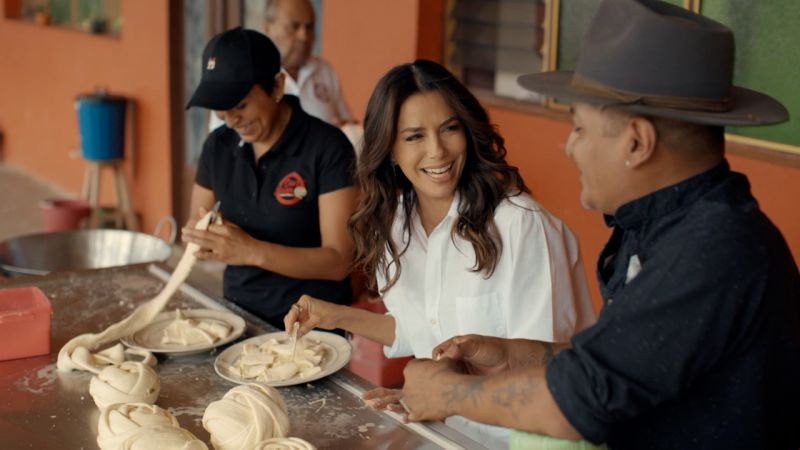You’ll no doubt be hungry after watching “Eva Longoria: Searching for Mexico.”
Every episode is full of mouthwatering regional specialties prepared by chefs all over the country.
For those wanting to follow in Eva Longoria’s footsteps, below is a guide to the restaurants and locations she visited.
Oaxaca: A gastronomic capital
Nestled within three vast mountain ranges, Oaxaca is a magnet for food lovers in the know.
A thrill of any visit here is sampling the moles, as well as dishes such as tlayudas (thin Oaxacan “pizzas”), spicy hot chocolate and asado grilled in smoky market stalls. “It is on another level gastronomically, one of the best places I’ve been to in the world,” Longoria said.
• Mercado de Abastos is a giant market on the edge of Oaxaca City. If you want your chocolate fix, the mercado is still the place to come. This region is known for its moles – complex sauces featuring many blended ingredients.
• Casa Oaxaca makes Oaxaca’s famous mole negro drizzled over turkey breast. Longoria called it a magnificently complex and sophisticated sauce.
• At Las Quince Letras, chef Celia Florián made Longoria quesillo – a stretched Oaxacan cheese –– with crickets and edible flowers.
• In the area of Oaxaca located on the Isthmus of Tehuantepec, several muxes, who identify as a third gender and are guardians of Zapotecan cuisine, cooked up stuffed pork with pineapple served alongside pureed potatoes. Longoria called it “the perfect combination.”
• The farming town of Santa Ana Zegache is the unassuming epicenter of corn. Corn has been worshipped for over 6,000 years and is still the beating heart of Mexican cuisine.
• In San Baltazar Chichicapam, Longoria visited a palenque (agave farm) run by Doña Berta, one of very few female mezcaleras. The farm produces mezcal, the smoky liquor for which this region is famed.
• La Cocina de Humo is a hip restaurant using local ingredients. Chef Thalia Barrios García is known for her heirloom tomato salad with beet puree and herbal dressing. Longoria said it’s the “perfect dish.” Here’s the recipe.
Yucatán: Defined by the Maya
Mayan DNA runs through the recipes in Yucatán, which has the largest Maya population in Mexico.
The state is located along the Gulf of Mexico and is surrounded by dense forests that isolate it off from the rest of the country. The Maya thrived here for thousands of years before the arrival of the Spanish conquistadors in the 1500s. The region’s geography and turbulent history have had a significant impact on the cuisine.
• Ixi’im mixes modern and ancestral techniques and flavors. The restaurant has its own version of the most famous dish from the Yucatán, cochinita pibil. Chef Luis Ronzón slow-cooks pork underground after it’s marinated in sour orange and spices.
• Condimentos Enrique is a family-run business that sells recados (spice pastes) in Mercado de Santiago in Mérida.
• At Huniik, which means “unique spirit” in Maya, chef Roberto Solís makes onion tempura with black recado. “I have never had anything like this. This is gorgeous, and it’s delicious,” said Longoria.
• In his home in Xocén, chef Alberto Kuku prepared one of the oldest dishes, Mayan chicken tamales, for Hanal Pixán, a holiday celebrated by the Maya people that means “food for the souls.” The food honoring the dead “can easily be carried back to the underworld,” he said.
• Chef Regina Escalante, who runs Merci in Mérida, showed Longoria how to make grilled seabass with mango, avocado and flor de sal. “I’d have this as my last meal on Earth,” said Longoria. Here’s the recipe.
• At Uxmal, Mayan archaeologist Don Pepe cooked up smoked pork and bean stew. It cooks underground for 12 hours.
• Kinich in Izamal is famous for its queso relleno. A key ingredient is, surprisingly, Dutch cheese. See how it’s made:
Mexico City: The city of tacos
“It’s crazy, it’s crowded, it’s noisy – and I love it!” Longoria said as she walked the streets of Mexico City, where she lives part-time with her family. This region was once the capital of the mighty Aztec empire, known as Tenochtitlán until the Spanish invaded about 500 years ago and changed its name to Mexico City.
Here are the places Eva Longoria visited in the episode:
• Tomasa is a Mexican bakery known for its conchas, a fluffy sweet bread with a crunchy topping.
• El Huequito in the Historic Center serves up delicious al pastor tacos, which are a staple in Mexico City.
• Tacos Los Alexis is sizzling hot in the taco world. Owner Alexis Ayala uses his five-star culinary training to transform traditional recipes from his childhood into to-die-for gourmet tacos.
• Contramar in Roma, the bohemian part of town, is one of Longoria’s favorite restaurants. Owner and chef Gabriela Cámara made her signature dish: pescado a la talla.
• Máximo Bistrot, a gourmet restaurant that marries French and Mexican cuisine, is run by chef Eduardo “Lalo” García. For Longoria, he made a roasted beet salad with rocket and wilted purslane. Best known as a weed, purslane is nonetheless edible and very nutritious.
• Mercado de Jamaica is one of hundreds of markets in the city. At the street food stalls, Longoria tried green chorizo tacos and tlacoyos, thick oval-shaped tortillas typically stuffed with beans or cheese.
• Casa Tochan refugee shelter is the first shelter for immigrants in Mexico City. The residents cook dishes from their homeland to share with their housemates.
• El Moro is an institution famous for its churros and chocolate.
• Hiyoko restaurant in Little Tokyo cooks up a Mexican-Japanese fusion. Chef and restaurateur Edo López whipped up tapioca tostadas, chicken skewers with ants and duck donburi.
After each episode, we’ll add to this story with the latest locations where you can sample food featured in “Searching for Mexico.”
